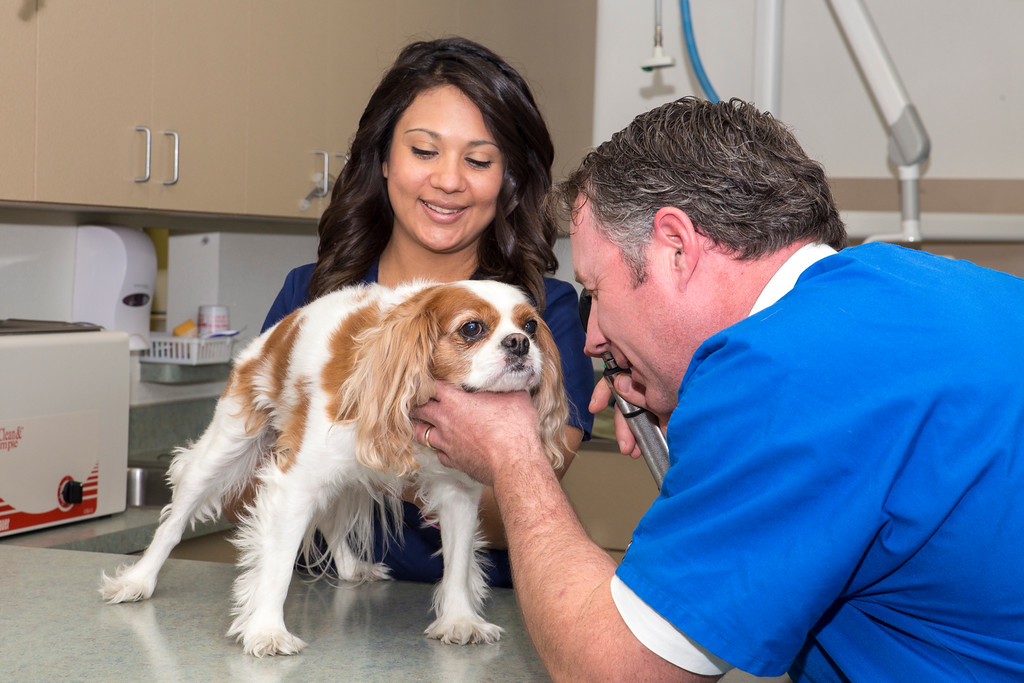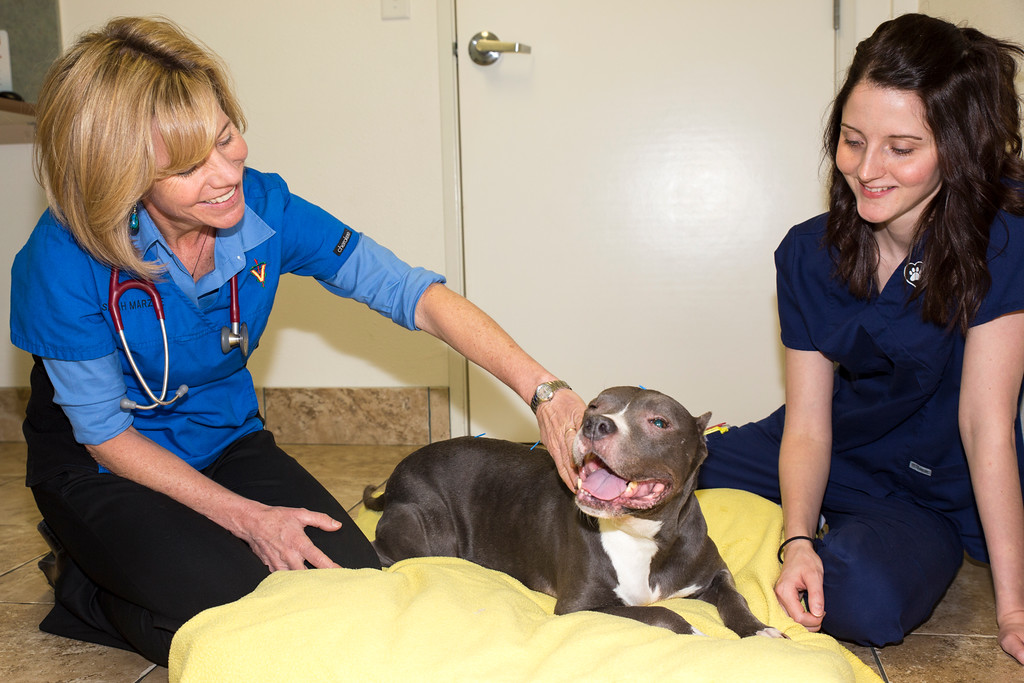What can I expect from a "Complete Physical Examination" for my pet at Topaz Veterinary Clinic?
|
|
 |
The doctors at Topaz Veterinary Clinic in Tempe, AZ believe that annual complete physical examinations are an essential part of a preventive health plan for all pets.
Pets age up to 7 times faster than we do, so a once yearly exam for pets can be the equivalent of a person only seeing a doctor once every 4-7 years. Many things can change during that period of time and a complete physical exam can often help detect health problems long before the symptoms become visible to pet owners. Since our pets can't talk to us, veterinarians are trained to look for sometimes subtle changes that may indicate more serious underlying problems.
During a physical examination, our doctors check out each patient's visible body systems for any signs of illness. We call this a "nose to toes" exam because we look at all of the following:
|
|
Dental Examination: A thorough check of your pet's teeth, gums, and palate for tartar accumulation, gum disease (gingivitis), bad breath and/or pain caused by diseased teeth, retained baby teeth that can interfere with the development and health of the adult teeth, and palate defects like cleft palates in puppies and elongated soft palates in certain breeds of dogs.
|
|
Ear Examination: An assessment of the outer part of the ear for signs of infection or allergy along with using an otoscope to look into the ear canals for any discharge, infection, foreign bodies, or parasites.
|
|
Eye Examination: An assessment of the outer parts of the eye including the eyelids and membranes around the eyes (conjunctiva) looking for any signs of inflammation, unusual growths, hair loss, abnormal or infected tear production along with an examination of the eye itself from the outer covering (the cornea) to the lens in the center, and all the way to the retina.
|
|
Throat/Neck Examination: An assessment of the neck structures including the lymph nodes, thyroid glands, and trachea for any enlargements or sensitivity that could indicate infection, inflammation, or cancer.
|
|
Cardiac Examination: Assessment of the heart by listening with a stethoscope with two different sides that allows us to listen to the hearts of both 150 pound Saint Bernard dogs and tiny newborn kittens. We listen for any changes in the rhythm of the heart (called arrhythmias that indicate a problem with the electrical conduction system of the heart) and for any heart murmurs that can indicate problems with the size of the heart or the function of the valves that separate the chambers of the heart. We also check each patient's pulses to make sure they are strong indicating good blood pressure and normal blood flow from the heart to the rest of the body.
|
|
Lungs/Respiratory System Examination: Assessment of the lungs by listening with a stethoscope for any changes in the lung sounds that could indicate fluid in or around the lungs, asthma, and also assessing the breathing rate and effort for signs of difficult or labored breathing. We also look at the nose for any discharge, asymmetry, pigmentation changes, and congestion.
Abdominal Examination: For this, we use our hands to feel or palpate the various organs inside the abdomen including the liver, spleen, stomach, intestines, kidneys, and bladder for any physical changes including tumors, foreign bodies, pain, distention, possible bladder stones, etc.
External Genitalia Examination: An assessment of the vulva in females and penis, prepuce, and testicles in males for any signs of infection or cancer and also looking for any hereditary defects like undescended testicles or hypoplastic vulvas.
Muscles, Bones, and Joints Examination: An assessment of the whole body looking for any muscle weakness or muscle loss, joint stiffness, loss of joint flexibility, "crepitus" in the joint that can be felt with degenerative joint disease (arthritis), pain associated with palpation of the spine and movement of the neck, difficulty getting up and down, and general conformation.
|
 |
|
Brain and Spinal Cord Examination: An assessment of mentation, seizure activity, circling behavior, differences in pupil size and facial muscles indicating brain and nerve problems along with assessment of the legs and reflexes for symptoms of spinal cord problems.
|
|
Skin Examination: A thorough examination of the skin and fur for problems including allergies, skin infections, parasites (fleas/ticks/mange mites), fungal disease (ringworm), trauma, hernias, toenail infections, dry skin, hair loss, etc. Some of these changes can be seen with dietary problems or underlying thyroid or adrenal gland disease.
|
|
Lymph Node Examination: An assessment of the lymph nodes located under the neck, in front of the shoulders, and behind the knees for any enlargement that could indicate infection, inflammation, or cancer.
|
|
Weight: We assess the overall body condition for weight changes that can indicate certain diseases like thyroid disease or diabetes and initiate discussions with owners about possible lifestyle and diet changes that can be contributing to unwanted weight gain or loss.
|
|
Temperature: We take the temperature of every patient to look for fever that may not be apparent to the owner. Both dogs and cats have higher normal body temperatures than people so they can feel warm to us even when they don't have a true fever.
|
|
|
|